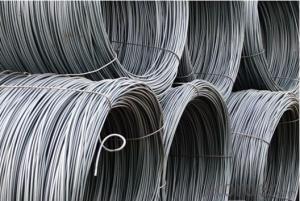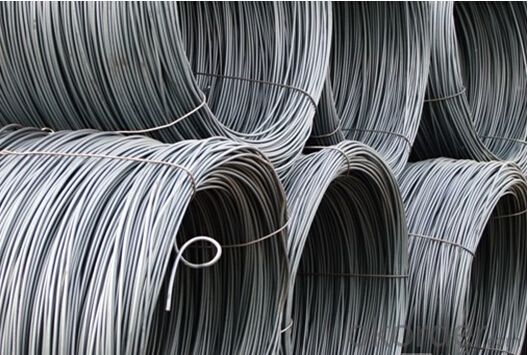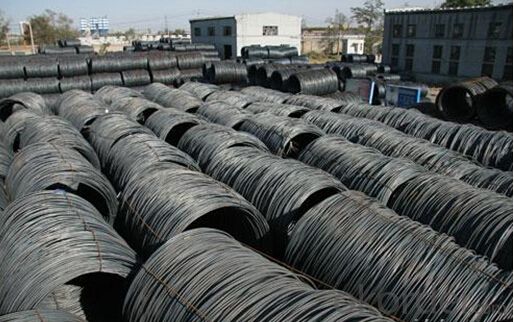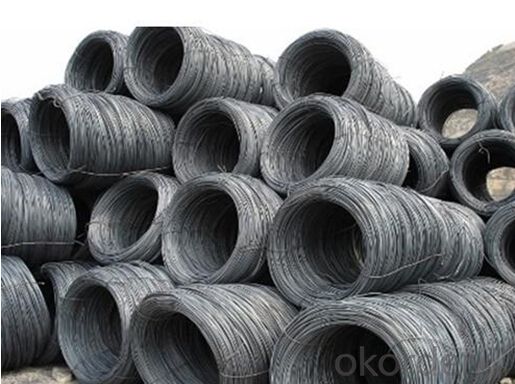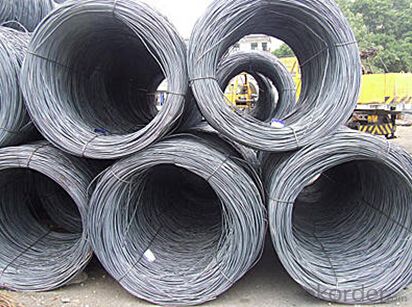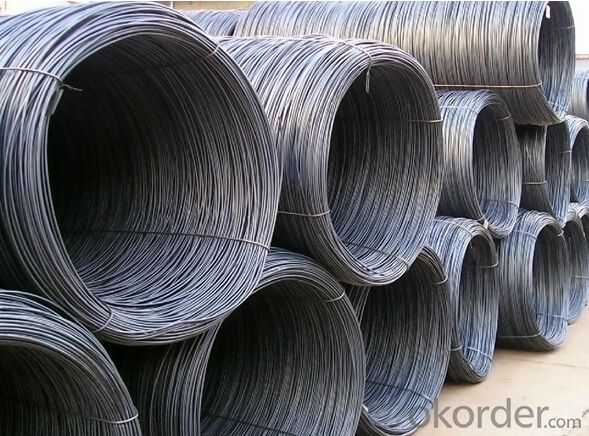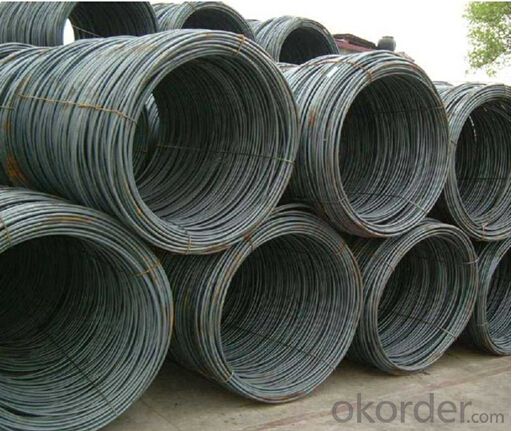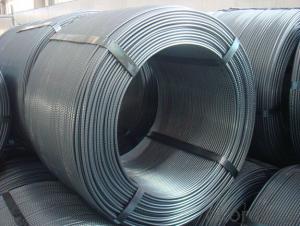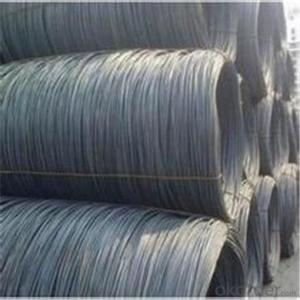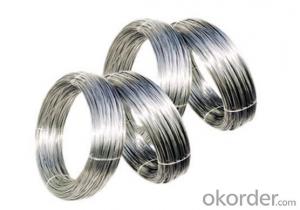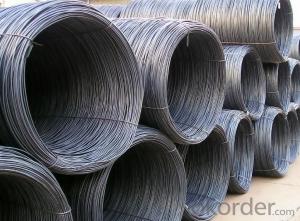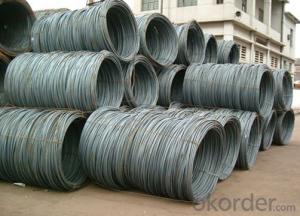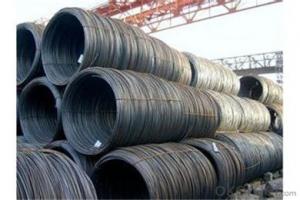5.5mm SAE1008 Steel Nail Wire Rod Manufacturer
- Loading Port:
- Tianjin
- Payment Terms:
- TT OR LC
- Min Order Qty:
- 10 m.t.
- Supply Capability:
- 10000 m.t./month
OKorder Service Pledge
OKorder Financial Service
You Might Also Like
Specification
5.5mm SAE1008 Steel Nail Wire Rod Manufacturer
Details of the 5.5mm SAE1008 Steel Nail Wire Rod Manufacturer
| Steel Grade | Q195-Q235,Q235,SAE 1008-1018 Hot Rolled Steel Wire Rod |
| Diameter | 5.5, 6.5, 7,8, 9,10, 12,14mm.etc. |
| Coil weight | 2m.t. |
| Application | drawing, construction materials, machinery parts,construction for Houses, Bridges, Roads,Packing |
| Deliver Time | 25-30 days after receipt of L/C or deposit by T/T |
| Packing | In coils, loading in container or by bulk vessel |
| Payment terms | 1).100% irrevocable L/C at sight. |
| 2).30% T/T prepaid and the balance against the copy of B/L. | |
| 3).30% T/T prepaid and the balance against L/C |
| Chemical Composition(%) | ||||||
| C | Mn | Si | S | P | Cr | |
| SAE1006B | 0.03~O.07 | ≤0.32 | ≤0.30 | ≤0.045 | ≤0.040 | 0.3-0.35 |
| Mechanical properties | ||||||
| Yield strength(N/mm2) | Tensile strength(N/mm2) | Elongation(%) | ||||
| 250-280 | 350-380 | ≥32 | ||||
| Grade | Chemical Composition(%) | |||||
| C | Mn | Si | S | P | Cr | |
| SAE1008B | 0.10max | 0.3~O.50 | 0.15max | 0.050max | 0.040 max | 0.3-0.35 |
| Mechanical properties | ||||||
| Yield strength(N/mm2) | Tensile strength(N/mm2) | Elongation(%) | ||||
| ≥195 | 315-430 | ≥30 | ||||
Supplier of the 5.5mm SAE1008 Steel Nail Wire Rod Manufacturer
CNBM International Corporation is the most import and export platform of CNBM group(China National Building Material Group Corporation) ,which is a state-owned enterprise, ranked in 270th of Fortune Global 500 in 2015.
With its advantages, CNBM International are mainly concentrate on Cement, Glass, Iron and Steel, Ceramics industries and devotes herself for supplying high quality series of refractories as well as technical consultancies and logistics solution.
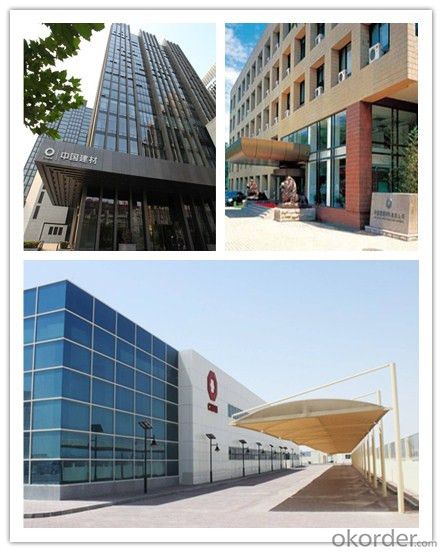
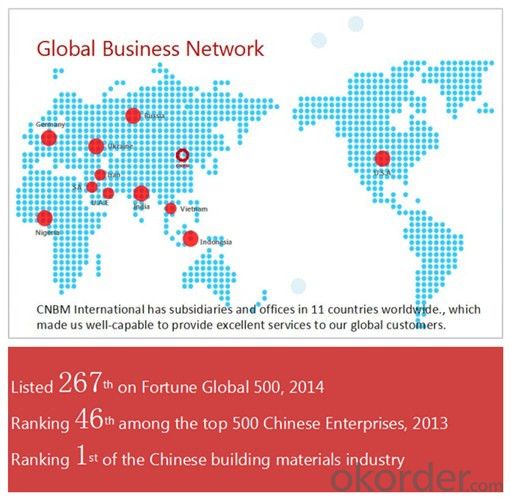
Delivery of the 5.5mm SAE1008 Steel Nail Wire Rod Manufacturer
Packaging Detail | Sea worthy packing /as per customer's packing instruction |
Delivery Detail | 15 ~ 40 days after receiving the deposit |
Products Show
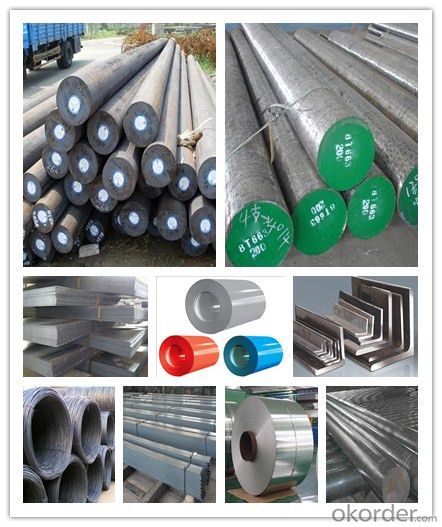
FAQ:
Are you a trading company or manufacturer? | Manufacturer |
What’s the MOQ? | 3 metric ton |
What’s your delivery time? | 15-35 days after downpayment received |
Do you Accept OEM service? | Yes |
what’s your delivery terms? | FOB/CFR/CIF |
What's the Payment Terms? | 30% as deposit,70% before shipment by T/T |
Western Union acceptable for small amount. | |
L/C acceptable for large amount. | |
Scrow ,Paybal,Alipay are also ok | |
Why choose us? | Chose happens because of quality, then price, We can give you both. Additionally, we can also offer professional products inquiry, products knowledge train (for agents), smooth goods delivery, excellent customer solution proposals. |
What's your available port of Shipment? | Main Port, China |
What’s your featured services? | Our service formula: good quality+ good price+ good service=customer's trust
|
Where are your Market? | Covering more than 160 countries in the world |
- Q: How does special steel contribute to the medical aftermarket industry?
- Special steel plays a crucial role in the medical aftermarket industry by providing high-quality materials for the manufacturing of various medical devices and instruments. Its unique characteristics, such as corrosion resistance, high strength, and biocompatibility, enable the production of durable and long-lasting equipment like surgical instruments, implants, and prosthetics. The use of special steel ensures the safety and effectiveness of these medical products, ultimately contributing to improved patient outcomes and advancements in healthcare.
- Q: What are the different methods of testing special steel for quality assurance?
- There are several methods of testing special steel for quality assurance, including mechanical testing, chemical analysis, non-destructive testing, and metallographic analysis. Mechanical testing involves measuring the steel's strength, hardness, and toughness through techniques such as tensile testing, impact testing, and hardness testing. Chemical analysis helps determine the composition and impurities in the steel through methods like spectroscopy and elemental analysis. Non-destructive testing methods like ultrasonic testing, magnetic particle testing, and radiographic testing are used to detect any defects or flaws in the steel without causing damage. Metallographic analysis involves examining the steel's microstructure through techniques like optical microscopy and electron microscopy to assess its internal structure and identify any potential issues.
- Q: What are the properties of corrosion-resistant stainless steel?
- Corrosion-resistant stainless steel has several key properties. Firstly, it has a high level of chromium content, typically around 10-20%, which forms a protective oxide layer on the surface of the steel. This oxide layer acts as a barrier, preventing oxygen and moisture from reaching the underlying metal and causing corrosion. Additionally, stainless steel contains other alloying elements such as nickel, molybdenum, and nitrogen, which further enhance its corrosion resistance. These alloys help to stabilize the oxide layer and make it more resistant to corrosion by aggressive substances such as acids, salts, and chlorides. Furthermore, stainless steel is highly durable and has excellent strength, making it suitable for various applications in corrosive environments, including marine, chemical, and food processing industries.
- Q: How does special steel perform in extreme cold temperatures?
- Special steel is specifically designed to perform well in extreme cold temperatures. It is made using alloys that have a low temperature ductility, meaning they can withstand and maintain their structural integrity even in extremely cold conditions. This type of steel is often used in applications such as Arctic exploration, oil and gas operations in cold environments, and in the aerospace industry. One of the key properties of special steel is its ability to resist brittleness at low temperatures. Unlike regular steel, which becomes brittle and prone to cracking in extreme cold, special steel retains its toughness, making it suitable for use in sub-zero conditions. This is achieved by carefully selecting and controlling the composition of the alloy, which allows for a better balance between strength and ductility. Furthermore, special steel has excellent corrosion resistance, which is particularly important in cold environments where exposure to snow, ice, and moisture is common. The alloying elements in special steel, such as chromium and nickel, form a protective oxide layer on the surface, preventing corrosion and maintaining the structural integrity of the steel. In addition, special steel also has good thermal conductivity, which means it can efficiently transfer heat even in extreme cold temperatures. This property is crucial in applications where heat management is essential, such as in the aerospace industry or in equipment operating in cold climates. Overall, special steel is specifically engineered to perform exceptionally well in extreme cold temperatures. Its low temperature ductility, resistance to brittleness, corrosion resistance, and thermal conductivity make it a reliable and durable material for various applications in cold environments.
- Q: How is special steel used in the power generation industry?
- Special steel is widely used in the power generation industry for various applications. It is utilized in the manufacturing of turbines, boilers, and other critical components due to its exceptional strength, heat resistance, and corrosion resistance properties. Special steel is crucial in ensuring the efficiency and reliability of power plants, enabling them to withstand high temperatures and pressures, while also minimizing downtime and maintenance costs.
- Q: How does special steel contribute to the energy storage industry?
- Special steel plays a crucial role in the energy storage industry by providing high-strength and corrosion-resistant components for the manufacturing of batteries, turbines, and other energy storage systems. It enables the production of more efficient and durable energy storage devices, improving their overall performance and lifespan. Special steel also helps in reducing energy losses during storage and transmission processes, thus contributing to the increased efficiency of the energy storage industry.
- Q: What are the specific requirements for special steel used in the railway sector?
- Ensuring the safety, durability, and efficient operation of railway infrastructure in the railway sector relies heavily on meeting the specific requirements for special steel. Some of the key requirements include: 1. Exceptional strength is essential for the special steel used in the railway sector to withstand heavy loads, vibrations, and impacts. This is crucial to maintain the structural integrity of tracks, bridges, and other components. 2. To minimize the need for frequent maintenance and replacement, special steel must have excellent wear resistance as railway tracks and wheels experience significant wear due to continuous contact and friction. 3. Railway components are subjected to constant cyclic loading, which demands high fatigue resistance in the steel. This ensures they can withstand repetitive stress and prevents fatigue failures. 4. Special steel must possess good corrosion resistance to prevent rusting and degradation, thereby ensuring a longer service life in the face of various environmental conditions such as moisture, extreme temperatures, and chemicals. 5. In certain applications like rail joints and fasteners, special steel is exposed to high temperatures due to friction and stresses. Good heat resistance is necessary for the steel to maintain its mechanical properties under such conditions. 6. Good weldability of special steel is essential to enable efficient and reliable joining of components during manufacturing and maintenance processes in the railway sector. 7. The steel must exhibit sufficient ductility and toughness to absorb energy and resist fracture in the event of a collision or impact, ensuring passenger safety. 8. Special steel used in the railway sector must maintain its dimensional stability under varying temperatures and loads to prevent deformation and ensure proper alignment of tracks and components. Meeting these specific requirements for special steel in the railway sector is crucial to ensure the safety, reliability, and longevity of railway infrastructure. This contributes to the smooth operation of the entire transport network.
- Q: What are the main characteristics of tool steel forgings?
- Tool steel forgings have several main characteristics that make them highly desirable for a variety of applications. First and foremost, tool steel forgings are known for their exceptional durability and strength. They are specifically designed to withstand high levels of stress, making them ideal for applications where toughness and resistance to wear and tear are crucial. This strength allows tool steel forgings to maintain their shape and integrity even under extreme conditions, such as high temperatures or heavy loads. Another key characteristic of tool steel forgings is their excellent hardness. Tool steel is able to achieve high levels of hardness through a process called quenching and tempering, which involves heating the steel to a specific temperature and then rapidly cooling it. This hardness makes tool steel forgings highly resistant to abrasion, making them suitable for cutting, shaping, and forming materials. Additionally, tool steel forgings exhibit excellent dimensional stability. This means that they have minimal distortion or shrinkage when subjected to heat or pressure, making them ideal for precision tooling applications. Their dimensional stability also ensures that the forgings maintain their accuracy and reliability over time, which is essential in industries such as manufacturing and engineering. Furthermore, tool steel forgings offer good machinability, meaning they can be easily shaped, drilled, and cut to meet specific requirements. This makes them versatile and adaptable for a wide range of applications, from forming complex shapes to creating intricate designs. Lastly, tool steel forgings have excellent wear resistance. This characteristic allows them to maintain their cutting edges and surfaces for extended periods, reducing the need for frequent sharpening or replacement. This wear resistance is particularly advantageous in industries such as automotive, aerospace, and tool manufacturing, where longevity and efficiency are paramount. In conclusion, the main characteristics of tool steel forgings include exceptional durability and strength, high hardness, excellent dimensional stability, good machinability, and excellent wear resistance. These characteristics make tool steel forgings highly sought after in various industries, where reliability, precision, and longevity are critical.
- Q: How does special steel meet the requirements of specific industries?
- Special steel meets the requirements of specific industries by offering superior mechanical properties, corrosion resistance, and heat resistance, which are essential for various applications. Its tailored composition and precise manufacturing processes ensure the steel can withstand extreme conditions, such as high temperatures, pressure, and harsh environments. Additionally, the versatility of special steel allows for customization to meet specific industry needs, resulting in enhanced performance, durability, and overall efficiency.
- Q: How does special steel contribute to the power generation sector?
- Special steel plays a crucial role in the power generation sector by offering various benefits and contributing to the overall efficiency and reliability of power generation equipment. One of the primary ways special steel contributes is through its superior strength and durability. Power generation involves highly demanding and extreme conditions, including high temperatures, pressure, and corrosive environments. Special steel is specially designed to withstand these harsh conditions and maintain its structural integrity, ensuring the long-term reliability and safety of power generation equipment. Special steel is used in various components of power generation equipment, such as turbines, boilers, and generators. In gas turbines, for example, special steel is utilized for the construction of turbine blades and vanes, which are subjected to immense heat and rotational forces. The high-temperature resistance and strength of special steel allow these components to operate at elevated temperatures without deformation or failure, thereby increasing the efficiency and performance of gas turbines. Moreover, special steel offers excellent corrosion resistance, making it suitable for use in power plants that utilize water-based cooling systems. These cooling systems often employ seawater or chemically treated water, which can be highly corrosive. By using special steel in critical components like condensers and heat exchangers, the power generation sector can significantly reduce maintenance and replacement costs associated with corrosion-related issues. Additionally, special steel is crucial in the construction of nuclear power plants. It is used in the fabrication of reactor pressure vessels, steam generators, and fuel assemblies. The radiation resistance and high strength of special steel ensure the safety and reliability of these components in nuclear power plants, thereby contributing to the overall efficiency and sustainability of the power generation sector. In summary, special steel's superior strength, high-temperature resistance, corrosion resistance, and radiation resistance make it an indispensable material in the power generation sector. It enhances the efficiency, reliability, and safety of power generation equipment, ultimately contributing to the overall growth and sustainability of the power generation industry.
Send your message to us
5.5mm SAE1008 Steel Nail Wire Rod Manufacturer
- Loading Port:
- Tianjin
- Payment Terms:
- TT OR LC
- Min Order Qty:
- 10 m.t.
- Supply Capability:
- 10000 m.t./month
OKorder Service Pledge
OKorder Financial Service
Similar products
Hot products
Hot Searches
Related keywords
